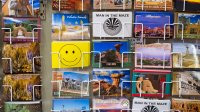The Power of the Postcard
Postcards may seem like relics of the snail-mail age, but they can still provide an exciting, fascinating entree into literacy for new readers and writers.
Your content has been saved!
Go to My Saved Content.In years to come, people may look back and call this time the Age of the Screens, when our bright young minds were slowly drawn into the blinking, shimmering lights. Of course, there are countless excellent, important, and urgent computer skills to teach children, but at the same time, it's important to hang onto those techniques and tools that have always worked, that always elicit wonder or surprise, that inspire learning.
My suggestion in this post is to engage with the simple but worthwhile act of sending a postcard -- something that I admit seems from a bygone age. At this point, I must confess a special interest in this area: I love collecting postcards. Most of mine are souvenirs from holidays or museums, and I have a few that are over 30 years old. Recently, I've come to appreciate the benefits of using postcards as a form of feedback and inspiration for writing.
My Buddy Class
I am currently a fourth-grade teacher in a European international school, and my class is "buddied" with a first-grade class. I was a dedicated first-grade teacher when I started teaching over nine years ago, and I appreciate the importance of inspiring writing at the earliest ages. If young learners can recognize writing as something meaningful, fun, and personal, it increases the chance of those students sustaining their interest in writing by the time they get to my grade.
Around one lesson a week, I combine my fourth-grade class with my Buddy Class. Sometimes, my older students share their learning with their young buddies. Other times, we assist our buddies with their work or read books together. We've supported each other in school assembles, and in my role as the school’s storyteller, I've told many stories to both classes. Encouraged by their teacher, the first-grade students started writing me letters of appreciation or with questions linked to their studies. I just had to write back.
An Old School Idea
For many years now, I've given my students postcards as a gift around Christmas time or the end of the year. I write a positive and personalized message that each student can take home and share with his or her family. But this year, as the first-grade letters started coming my way, I decided to write my responses on a postcard. The smaller size of the postcard forced me to be concise while giving enthusiastic, positive feedback. The visual nature of the postcard also makes it an appealing object to receive.
A key aspect of this system is the speedy delivery of the postcards. If the response is left too long, first-grade students may have forgotten why they wrote their letters to me in the first place. Because the postcard allows only a small amount of writing, it's possible for me to return it in a short space of time, and I take five minutes out of my planning time to personally deliver it. Luckily, our patient first-grade teacher is happy to be briefly interrupted, knowing that every other student is watching and wondering how to get his or her own postcard. The answer is simple: write me a letter.
Practicing Literacy Inspires Literacy
Among emerging readers and writers, any method that inspires reading and writing in first grade should be encouraged, an idea that I was busy promoting when I worked as a literacy coordinator. So I'm delighted to now be promoting this simple but effective movement. The many letters that I receive genuinely inspire me, and I enjoy writing back and knowing that it helps create a cycle of authentic literacy.
I particularly like this strategy for developing confidence and communication. The younger students feel more confident to take risks and share their work with me. This fosters interactions around the school, strengthening our community. At the same time, the first-grade teacher has told me that her students' families appreciate the postcards. The students pin them up on their bedroom wall. Parents have commented how they feel that the cards validate their young children's thinking.
Don't Forget to Write!
As with any student-driven literacy initiative, there is a natural rise and fall in interest and activity. Sometimes, I receive a lot of letters. Other times, the proverbial postbox is empty. I have a rule that I won't issue a postcard without prompting, although that can include sending one to the whole class expressing appreciation for a public performance at a school event. I'm sure, though, that these students will enjoy receiving postcards for some time to come. I will always enjoy sending them.
What are your favorite literacy activities? What are your strategies for generating student excitement about them?
